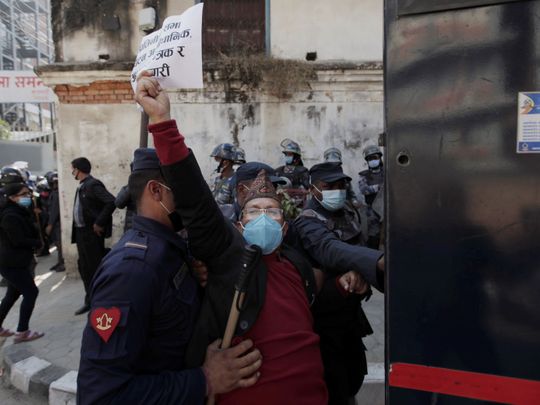
Kathmandu, Nepal - Nepal’s top leader dissolved parliament Sunday amid infighting among members of the governing party, throwing into doubt the political future of a strategically important Himalayan country where China and India have long jockeyed for influence.
The prime minister, K.P. Sharma Oli, called for the dissolution of the lower house of parliament despite protests from his own Nepal Communist Party and opposition groups, including the largest, Nepali Congress. Nepal is now set to hold elections starting in late April, more than a year earlier than the expected vote in November 2022.
Oli made his move in the face of rising dissatisfaction with his job performance even within the ranks of his own party. He was elected to a second stint as prime minister in 2017 on promises of tamping down corruption and forging stronger ties with China and its economic growth machine.
But Oli’s administration has been plagued with its own corruption allegations as well as criticism of his government’s handling of the pandemic, which has devastated an economy that has long depended on tourism and remittances from its citizens abroad. Divisions also lingered within his party, which was created by the alliance of two smaller communist parties in 2017.
By dissolving the lower house of parliament, Oli might avoid a potential no-confidence vote from lawmakers. But experts said that he lacked the power to dissolve parliament and that the move could be challenged in Nepal’s highest court.
“Under existing constitutional provisions, dissolution of parliament can’t be the prime minister’s prerogative when there are many other options to form a new government,” said Bipin Adhikari, former dean of Kathmandu University Law School and a constitutional expert. “It’s an unconstitutional step.”
Nepal has long swung between favouring China or India. It has extensive economic ties with India, where many of its people work, and like India has a majority Hindu population.
Should Oli fall, China would lose a friend. Xi Jinping, China’s top leader, paid a high-profile visit last year. And Oli has made an effort to show his sympathy to Beijing by organising training on Xi Jinping Thought, as the Chinese leader’s instructions are called.
“Oli wasn’t an acceptable prime minister for India,” said Adhikari. “The next prime minister could be more India-friendly than Oli.”








